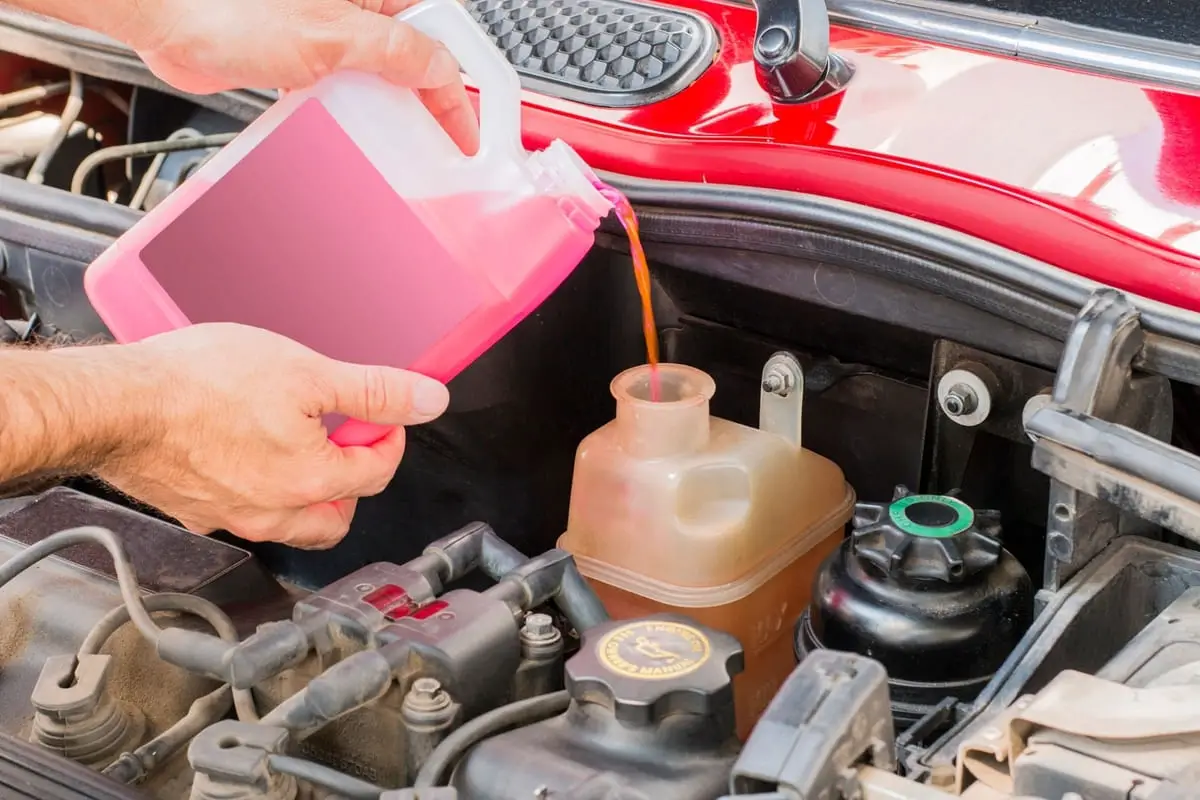2024 Guide: What It Costs to Change Transmission Fluid

Changing the transmission fluid in a car is an important part of routine maintenance that can help extend the life of the vehicle. The cost of this service can vary depending on several factors, including the make and model of the car, the type of transmission fluid used, and whether the work is done by a mechanic or if the owner decides to do it themselves.
According to recent estimates, the average cost of changing transmission fluid in 2023 is between $80 and $250. This includes the cost of the transmission fluid itself, which can range from $8 to $20 per quart, as well as the cost of a new transmission filter and pan gasket if necessary. Some cars may require more or less fluid, which can impact the overall cost of the service.
Additionally, if a car has a leak or needs a solenoid shift replacement, the cost can increase significantly.
Table of Contents
Why Change Transmission Fluid?
Changing transmission fluid is an essential part of vehicle maintenance. It helps to keep the transmission running smoothly and prevents damage to the transmission system. The following are some of the reasons why changing transmission fluid is important:
- Prevents Wear and Tear: Changing the transmission fluid regularly helps to prevent wear and tear on the transmission system. Over time, transmission fluid can become contaminated with debris, dirt, and other particles, which can cause damage to the transmission system. By changing the fluid, you can help to prevent this damage from occurring.
- Improves Performance: Old transmission fluid can cause the transmission to shift poorly, which can lead to poor performance and reduced fuel efficiency. By changing the fluid, you can help to improve the performance of your vehicle.
- Extends the Life of the Transmission: Regularly changing the transmission fluid can help to extend the life of the transmission. By keeping the transmission system clean and free of contaminants, you can help to prevent damage and ensure that the transmission lasts for as long as possible.
- Prevents Overheating: Transmission fluid helps to cool the transmission system. Over time, the fluid can break down and lose its ability to cool the system. This can lead to overheating, which can cause damage to the transmission system. By changing the fluid, you can help to prevent overheating and ensure that the transmission system stays cool.
Factors Affecting the Cost
When it comes to changing transmission fluid, there are several factors that can affect the cost. These include the type of vehicle, type of fluid, and labor costs.
Type of Vehicle
The type of vehicle you have can have a significant impact on the cost of changing your transmission fluid. Larger vehicles, such as trucks and SUVs, typically require more fluid and may have more complex systems that can be more challenging to work on. This can result in higher costs for both parts and labor.
Type of Fluid
The type of fluid used can also affect the cost of changing your transmission fluid. Some vehicles require specific types of fluid, which can be more expensive than standard transmission fluid. Additionally, synthetic fluids tend to be more expensive than conventional fluids.
Labor Costs
The cost of labor can vary depending on where you go to have your transmission fluid changed. Dealerships tend to have higher labor costs than independent repair shops. Additionally, the cost of labor can vary depending on the complexity of the job.
Here is a table outlining the estimated cost range for changing transmission fluid based on the factors mentioned above:
| Type of Vehicle | Type of Fluid | Labor Costs | Estimated Cost Range |
|---|---|---|---|
| Small Car | Conventional | Low | $80 – $150 |
| Truck/SUV | Synthetic | High | $200 – $400 |
It is important to note that these are just estimates and that the actual cost can vary depending on your specific situation. By following the manufacturer’s recommended maintenance schedule and being proactive about changing your transmission fluid, you can help avoid costly repairs down the road.
Average Cost of Transmission Fluid Change
Changing the transmission fluid in a vehicle is an essential part of regular maintenance. The cost of a transmission fluid change can vary depending on several factors such as the type of vehicle, location, and whether the service is performed by a professional or DIY.
DIY vs Professional Services
One way to save money on a transmission fluid change is to do it yourself. The cost of the parts needed, which include transmission fluid, a new transmission filter, and possibly a pan gasket, can range from $50 to $90. However, if you are not comfortable performing this type of maintenance, it is best to leave it to the professionals. The cost of a professional transmission fluid change can range from $90 to $150, depending on the location and type of vehicle.
Price Range by Vehicle Type
The cost of a transmission fluid change can vary depending on the type of vehicle. For example, a compact car may cost less than a luxury SUV. The average cost of a transmission fluid change for most vehicles is between $230 and $475. The cost can also vary depending on the type of transmission fluid required for the vehicle. Most transmission fluids range from $8 to $20 per quart, and most cars take between 5 and 15 quarts.
Price Range by Location
The cost of a transmission fluid change can also vary depending on the location. In general, the cost of living in an area can affect the price of services. For example, the cost of a transmission fluid change in a rural area may be less expensive than in a metropolitan area. Additionally, the cost of a transmission fluid change can vary depending on the service provider. It is recommended to obtain quotes from several service providers to compare prices and ensure you are getting a fair price.
Signs You Need a Transmission Fluid Change
Transmission fluid is essential for the proper functioning of your vehicle’s transmission system. Over time, the fluid can become contaminated or break down, leading to potential damage to the transmission. Here are some signs that indicate you may need a transmission fluid change:
- Burning Smell: If you notice a burning smell coming from your vehicle, it could be a sign that the transmission fluid is overheating. Overheated fluid can cause damage to the transmission, so it’s important to have it checked out as soon as possible.
- Slipping Gears: If you experience slipping gears or difficulty shifting, it could be a sign that the transmission fluid is low or contaminated. This can cause damage to the transmission over time, so it’s important to have it checked out by a professional.
- Grinding or Shaking: If you notice grinding or shaking when you shift gears, it could be a sign that the transmission fluid is low or contaminated. This can cause damage to the transmission over time, so it’s important to have it checked out by a professional.
- Fluid Leaks: If you notice fluid leaking from your vehicle, it could be a sign that the transmission fluid is low or leaking. This can cause damage to the transmission over time, so it’s important to have it checked out by a professional.
- Unusual Noises: If you hear unusual noises coming from your vehicle, such as whining or clunking, it could be a sign that the transmission fluid is low or contaminated. This can cause damage to the transmission over time, so it’s important to have it checked out by a professional.
If you experience any of these signs, it’s important to have your transmission fluid checked and changed if necessary. Regular maintenance of your vehicle’s transmission system can help prevent costly repairs down the road.
Conclusion
In conclusion, changing transmission fluid is an essential part of maintaining a vehicle’s transmission system. The cost of changing transmission fluid varies depending on several factors such as the type of vehicle, the type of transmission fluid, and the location of the service provider.
According to the search results, the average cost of changing transmission fluid at a local mechanic is around $400, which includes labor, transmission fluid, new gaskets, and filters. However, the cost can range from $130 to $290 depending on the type of service and the vehicle.
It is important to note that changing the transmission fluid is not the only maintenance required for a vehicle’s transmission system. Regular check-ups and maintenance can prevent costly repairs and replacements in the future.
By following the manufacturer’s recommended maintenance schedule and consulting with a trusted mechanic, vehicle owners can ensure their transmission system is in good condition. In addition, using high-quality transmission fluid and filters can extend the life of the transmission system.
Overall, changing transmission fluid is a necessary expense for vehicle owners, but it is a small price to pay compared to the cost of replacing a damaged transmission system.
FAQs
Can you change transmission fluid yourself?
Yes, it is possible to change the transmission fluid yourself. However, it is important to have the right tools and knowledge to do so. If you are not confident in your ability to change the fluid, it is recommended to take your car to a mechanic.
How often should you change transmission fluid?
The frequency of changing transmission fluid varies depending on the make and model of your car. However, it is generally recommended to change the fluid every 30,000 to 60,000 miles. Check your car’s owner manual for specific recommendations.
What happens if you don’t change transmission fluid?
If you don’t change the transmission fluid, it can lead to a variety of issues including decreased performance, transmission slipping, and even transmission failure.
How do you know when to change transmission fluid?
One way to know when to change the transmission fluid is to check the color and smell of the fluid. If it is dark and has a burnt smell, it is time to change the fluid. Another way is to check your car’s owner manual for specific recommendations.
How much transmission fluid does my car need?
The amount of transmission fluid needed varies depending on the make and model of your car. Check your car’s owner manual for specific recommendations.







